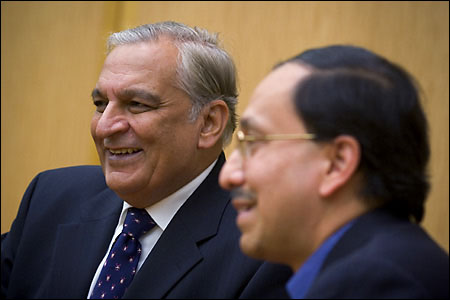Security comes from growth, not guns
Pakistani ambassador says economic development primary focus

Pakistan’s ambassador to the United States said Monday (Oct. 31) that the South Asian nation is banking on economic growth to build security rather than the military might it has relied on in the past.
Jehangir Karamat said Pakistan’s gross domestic product grew 8 percent last year and has averaged more than 6 percent over the past few years. National leaders would like to maintain this healthy growth rate and are looking to strengthen economic ties to central Asia, Southeast Asia, the United States, and even Iran.
“Pakistan is turning further from the military security of the past to economic security,” Karamat said.
Karamat said Pakistan is thankful for the international help it has received in the wake of the October earthquake and, relating it to the economy, said he hopes the economy can absorb the shock of such a disaster.
Karamat spoke on “Pakistan-U.S. Relations” at the Center for Government and International Studies to a crowd of about 50. The event was sponsored by the South Asia Initiative.
South Asia Initiative Director Sugata Bose, Gardiner Professor of Oceanic History and Affairs, introduced Karamat, saying that the Harvard community stands with Pakistan in responding to the earthquake tragedy. Bose also announced that Harvard students raised $16,000 that will go to earthquake relief.
“We stand in complete solidarity with the people of Pakistan in this hour of great human tragedy,” Bose said. “We at Harvard … will do everything we can to be a help to Pakistan in its hour of need.”
The U.S.-Pakistan relationship should be viewed as more globally strategic than merely locally convenient, Karamat said. Pakistan is an ally in the war on terror, is determined to foster democracy within its own borders, and is committed to regional stability, he said. Pakistan is particularly interested in stability in neighboring Afghanistan, he said, because the nation serves as a “land bridge” from Pakistan to markets in central Asia.
“Our trade with Central Asia, through Afghanistan, has increased many times in recent years,” Karamat said.
Though some critics have accused Pakistan of harboring Taliban remnants in its border region with Afghanistan, Karamat said Pakistan is cooperating closely with United States and Afghan authorities and acting quickly whenever they receive solid information. Harboring Taliban who seek to destabilize Afghanistan goes counter to Pakistan’s own economic interests in having a stable nation that can serve as a link to central Asia, Karamat said.
“We are committed to the war on terror,” Karamat said. “It’s an ongoing struggle and we are there, acting on every bit of actionable intelligence we can get.”
Pakistan has committed itself to nuclear nonproliferation and has increased its own nuclear security to ensure nuclear technology doesn’t leak to non-nuclear nations, Karamat said. He also said Pakistan has no desire to see a nuclear Iran. He added, however, that because it shares a border with Iran, Pakistan does wish to have peaceful relations and would cooperate on projects such as energy pipelines.
“I think we can live together and work together,” Karamat said.
Even Pakistan’s stormy relationship with India has improved in recent years, with a one-and-a-half-year cease-fire in place. This is partly due to Pakistan’s new commitment to economic growth and desire for regional stability to foster that growth, Karamat said.
Karamat said Pakistan is continuing on the road to full democracy, saying the current military-backed government is hoping to hold elections in 2007. In response to a question about elections leading to an undesirable change in government, Karamat said that if it happens, Pakistan will have to endure it, since manipulating elections to avoid that outcome would be wrong.
“I think [we’re] committed to bringing about a complete democratic environment in Pakistan,” Karamat said.
Social reforms within Pakistan are also important to combat extremism, he said, and the nation is working to improve literacy and gender equity, build roads, improve telecommunications, and take steps to build a stronger workforce.
Pakistan’s relationship with Israel has also improved since Israel moved to resolve the Palestinian situation, Karamat said, and with Israel offering aid to help earthquake victims.
“From a strategic point of view, I think U.S.-Pakistan relations are very important,” Karamat said.




